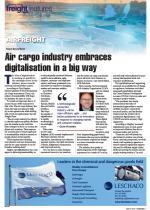The idea of digitalisation is catching on quickly in the airfreight sector as the industry moves towards meeting sustainability targets.According to Glyn Hughes, director-general of The International Air Cargo Association (Tiaca), the subject of sustainability will shape the industry for years to come.“It is such an important factor; it cannot be put off for tomorrow to deal with. The air cargo industry has taken the topic and placed it high up on the agenda even while dealing with Covid-19 implications,” he told Freight News. “The air cargo industry has played a critically important global role these past 22 months as the world has been reshaped to focus on society, the planet and ourselves. These aspects are cornerstones of Tiaca’s approach to sustainability, which is centred on people, planet and prosperity. “Each requires new thinking, new solutions and new investments, and the air cargo industry is on the frontline tackling them.” Hughes said digitalisation was a key aspect in delivering sustainability, as a technologically connected industry would be more efficient, agile, adaptive, customer- and employee-centric, and better positioned to be innovative in response to changing market and customer realities. According to Christian Dornhaus, managing director: Europe, Middle East and Africa (EMEA), PayCargo, the uptake of digitalisation is rapidly accelerating in the airfreight sector.This comes as Air Cargo Belgium (ACB) recently implemented PayCargo solutions into its operations, introducing cost-effective payment options, the rapid movement of funds, heightened transparency and improved security.“It is our duty to make business operations better for our members and the entire air cargo community across all levels, from finances to human resources,” said David Bellon, ACB chairman.More recently, the International Civil Aviation Organization (ICAO) and the United Nations Economic Commission for Europe (UNECE) have completed a new digital air cargo technical specifications guidance. These digital innovations will allow the air transport sector to transition away from longstanding paper-based documents that are used to facilitate the movement of global air freight to a more contactless air cargo environment.The solution also speaks to addressing some of the challenges experienced as a result of Covid-19, and will help reduce physical contact among international trade and transport professionals. The specifications and supporting materials are available free of charge to regulators, businesses and other interested stakeholders through the United Nations Development Account (UNDA) Covid-19 trade and transport project website. “The pandemic has clearly demonstrated the value of harmonised approaches to ensure resilient transport connectivity across all modes, and has further underscored the critical role of accelerated digitalisation,” said UNECE executive secretary Olga Algayerova.According to Hughes, increased digitalisation does not just speak to improved efficiency but also to increased safety and security.“These are, and will always be, the industry’s number one priority. From a security perspective, we work closely with regulatory agencies to ensure industry regulations support the need for efficient supply chains whilst protecting the system and the people working within it,” he said.A technologically connected industry will be more efficient, agile ... and better positioned to be innovative in response to changing market and customer realities.– Glyn Hughes

